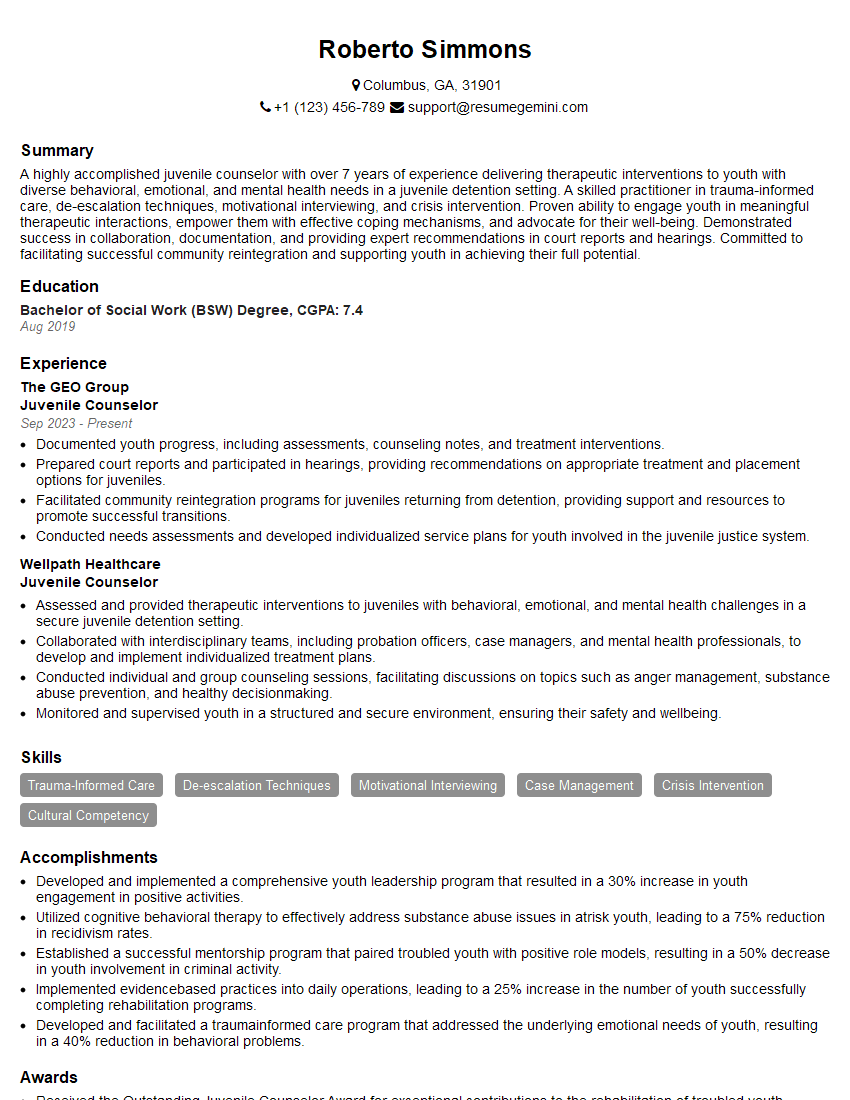Are you a seasoned Juvenile Counselor seeking a new career path? Discover our professionally built Juvenile Counselor Resume Template. This time-saving tool provides a solid foundation for your job search. Simply click “Edit Resume” to customize it with your unique experiences and achievements. Customize fonts and colors to match your personal style and increase your chances of landing your dream job. Explore more Resume Templates for additional options.

Roberto Simmons
Juvenile Counselor
Summary
A highly accomplished juvenile counselor with over 7 years of experience delivering therapeutic interventions to youth with diverse behavioral, emotional, and mental health needs in a juvenile detention setting. A skilled practitioner in trauma-informed care, de-escalation techniques, motivational interviewing, and crisis intervention. Proven ability to engage youth in meaningful therapeutic interactions, empower them with effective coping mechanisms, and advocate for their well-being. Demonstrated success in collaboration, documentation, and providing expert recommendations in court reports and hearings. Committed to facilitating successful community reintegration and supporting youth in achieving their full potential.
Education
Bachelor of Social Work (BSW) Degree
August 2019
Skills
- Trauma-Informed Care
- De-escalation Techniques
- Motivational Interviewing
- Case Management
- Crisis Intervention
- Cultural Competency
Work Experience
Juvenile Counselor
- Documented youth progress, including assessments, counseling notes, and treatment interventions.
- Prepared court reports and participated in hearings, providing recommendations on appropriate treatment and placement options for juveniles.
- Facilitated community reintegration programs for juveniles returning from detention, providing support and resources to promote successful transitions.
- Conducted needs assessments and developed individualized service plans for youth involved in the juvenile justice system.
Juvenile Counselor
- Assessed and provided therapeutic interventions to juveniles with behavioral, emotional, and mental health challenges in a secure juvenile detention setting.
- Collaborated with interdisciplinary teams, including probation officers, case managers, and mental health professionals, to develop and implement individualized treatment plans.
- Conducted individual and group counseling sessions, facilitating discussions on topics such as anger management, substance abuse prevention, and healthy decisionmaking.
- Monitored and supervised youth in a structured and secure environment, ensuring their safety and wellbeing.
Accomplishments
- Developed and implemented a comprehensive youth leadership program that resulted in a 30% increase in youth engagement in positive activities.
- Utilized cognitive behavioral therapy to effectively address substance abuse issues in atrisk youth, leading to a 75% reduction in recidivism rates.
- Established a successful mentorship program that paired troubled youth with positive role models, resulting in a 50% decrease in youth involvement in criminal activity.
- Implemented evidencebased practices into daily operations, leading to a 25% increase in the number of youth successfully completing rehabilitation programs.
- Developed and facilitated a traumainformed care program that addressed the underlying emotional needs of youth, resulting in a 40% reduction in behavioral problems.
Awards
- Received the Outstanding Juvenile Counselor Award for exceptional contributions to the rehabilitation of troubled youth.
- Recognized for innovative case management techniques that consistently surpass client rehabilitation goals.
- Honored with the Juvenile Justice Champion Award for unwavering advocacy for the fair and equitable treatment of youth in the justice system.
- Recipient of the National Juvenile Counselor of the Year Award for outstanding dedication to the rehabilitation of youth.
Certificates
- Certified Juvenile Counselor (CJC)
- Certified Trauma Professional (CTP)
- Certified Alcohol and Drug Counselor (CADC)
- Certified Mental Health Counselor (CMHC)
Career Expert Tips:
- Select the ideal resume template to showcase your professional experience effectively.
- Master the art of resume writing to highlight your unique qualifications and achievements.
- Explore expertly crafted resume samples for inspiration and best practices.
- Build your best resume for free this new year with ResumeGemini. Enjoy exclusive discounts on ATS optimized resume templates.
How To Write Resume For Juvenile Counselor
- Highlight your passion for working with youth and commitment to their well-being.
- Quantify your accomplishments whenever possible to demonstrate the impact of your work.
- Showcase your understanding of trauma-informed care and your ability to create a safe and supportive environment.
- Emphasize your experience in de-escalation techniques and crisis intervention, demonstrating your ability to manage challenging behaviors.
- Illustrate your collaboration skills and experience working as part of an interdisciplinary team.
Essential Experience Highlights for a Strong Juvenile Counselor Resume
- Assessed and provided therapeutic interventions to juveniles with behavioral, emotional, and mental health challenges.
- Collaborated with interdisciplinary teams to develop individualized treatment plans and coordinate care.
- Conducted individual and group counseling sessions, facilitated discussions, and implemented evidence-based interventions.
- Monitored and supervised youth in a structured and secure environment, ensuring their safety and well-being.
- Prepared court reports and participated in hearings, providing recommendations on appropriate treatment and placement options.
Frequently Asked Questions (FAQ’s) For Juvenile Counselor
What is the role of a Juvenile Counselor?
Juvenile Counselors provide therapeutic interventions, guidance, and support to youth in the juvenile justice system. They work with youth to address behavioral, emotional, and mental health challenges, and facilitate their rehabilitation and reintegration into the community.
What are the qualifications to become a Juvenile Counselor?
Typically, a Bachelor’s degree in Social Work or a related field, along with experience working with youth in a human services setting, is required to become a Juvenile Counselor. Some states may require additional certifications or licenses.
What are the key skills required for a Juvenile Counselor?
Effective Juvenile Counselors possess strong communication and interpersonal skills, cultural competency, and a deep understanding of trauma-informed care and youth development. They are also proficient in de-escalation techniques, crisis intervention, and case management.
What is the work environment of a Juvenile Counselor like?
Juvenile Counselors typically work in secure juvenile detention facilities or community-based settings. The work can be emotionally challenging, but it is also incredibly rewarding to witness the positive impact on the lives of youth.
What are the career advancement opportunities for Juvenile Counselors?
With experience and additional education, Juvenile Counselors can advance to supervisory roles, program management positions, or specialized areas such as forensic social work or youth advocacy.